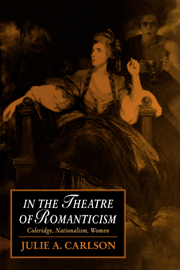Book contents
- Frontmatter
- Contents
- Acknowledgments
- List of abbreviations
- Introduction: Commanding genius in English romantic theatre
- 1 Constituting bodies politic and theatric
- 2 Coleridge's German revolution: Schiller's Wallenstein
- 3 A stage for potential men
- 4 Romantic antitheatricalism: surveilling the beauties of the stage
- Conclusion. A theatre of remorse
- Notes
- Index
Conclusion. A theatre of remorse
Published online by Cambridge University Press: 12 September 2009
- Frontmatter
- Contents
- Acknowledgments
- List of abbreviations
- Introduction: Commanding genius in English romantic theatre
- 1 Constituting bodies politic and theatric
- 2 Coleridge's German revolution: Schiller's Wallenstein
- 3 A stage for potential men
- 4 Romantic antitheatricalism: surveilling the beauties of the stage
- Conclusion. A theatre of remorse
- Notes
- Index
Summary
The plays of the second-generation romantic poets, especially of Shelley and Byron, have received more extensive treatment than have plays by Coleridge. Though still not placed on equal footing with their major poetic works, Shelley's and Byron's plays have been analyzed not simply as instances of mind but as important reflections on revolution, social history, and class and gender conflicts. This chapter draws on that body of critical work in its focus on the history plays of the second generation. But it examines selected features of those plays and scholarly accounts of them in light of this book's central focus on theatre. Such an orientation triggers the immediate observation that Shelley's history play, despite his stated intentions, never made it to the stage during this period and that one of Byron's, despite his intentions and actions, did. This observation constitutes a critical opportunity to do more than challenge the high drama of these writers' pronouncements about theatre. It invites us to analyze the relation of The Cenci (1819) and Marino Faliero (1820) to theatre in light of two conditions that shape the theatre of romanticism: remorse and women. In this context remorse identifies the psychic state of theatre generally and the play to which these two second-generation plays respond. Women activate the ambivalence toward theatre manifested by canonical poets of whatever political persuasion.
Viewing second-generation history plays in the context of attitudes toward remorse and women establishes at once their distance from Coleridge and their congruence with him.
- Type
- Chapter
- Information
- In the Theatre of RomanticismColeridge, Nationalism, Women, pp. 176 - 212Publisher: Cambridge University PressPrint publication year: 1994



